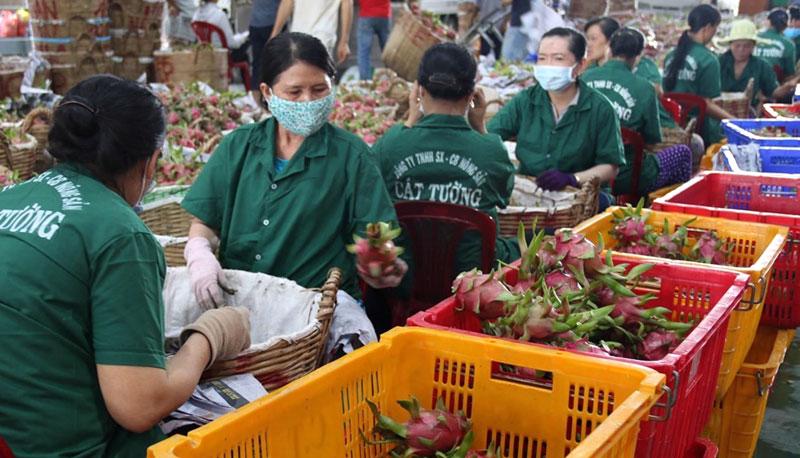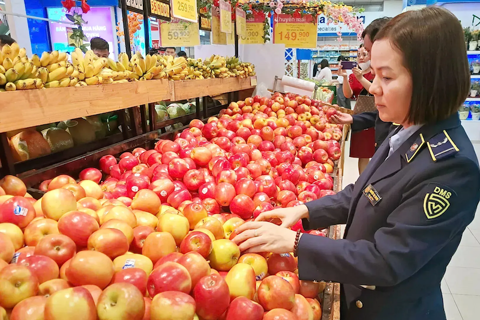Rising quality key to sustainable farm exports to the EU
Local firms have no other alternative but to opt for higher product quality to ensure sustainable exports to the EU market.
Vietnamese farm companies are under pressure to raise product quality standards amid the EU’s recent concern regarding food safety.
| Processing dragon fruits for exports at Cat Tuong Agricultural Processing and Production Company. Photo: Minh Tri |
Two years since the EU-Vietnam Free Trade Agreement (EVFTA) came into force, Vietnam has seen a surge in its farm exports to the EU, making it Vietnam’s third largest export market for agricultural products.
But lately, there have been multiple warnings from the EU’s authorities regarding food safety.
The Vietnam Sanitary and Phytosanitary Notification Authority and Enquiry Point (SPS), under the Ministry of Agriculture and Rural Development, has recently received a notice from the European Union Rapid Alert System for Food and Feed (EU RASFF) regarding Vietnamese instant noodles exported to Europe.
Specifically, Germany issued warnings against chicken-flavored instant noodles by Asia Food Joint Stock Company based in the southern province of Binh Duong, after detecting that they contain ethylene oxide (EO) exceeding the EU’s acceptable level.
Malta also warned against Nguyen Gia brand rice noodles and ordered a recall, alleging that such products have been processed from unauthorized genetically modified rice.
Meanwhile, Poland returned kid instant noodle products from Ho Chi Minh City-based Vietnam Food Industries JSC (Vifon) after warning about a hazard that has yet to be clarified.
The deputy director of MSF Vietnam, Ngo Xuan Nam, urged local companies to be aware of and strictly comply with the regulations of export markets to prevent products from being withdrawn from the market, which has negative impacts on their credibility.
“Companies are expected to tighten quality check on animal feed in aquaculture and also to address risks to food safety during the subsequent processing process,” Nam said.
For rice, vegetable, and fruit, Nam called for firms to follow regulations on the use of pesticides, control risks in the processing and packaging process, along with ensuring compliance with the rules of origin.
According to Nam, the EU regulates a very low EO level in dry vegetables and spices at 0.01-0.02 mg per kilogram. “Local traders exporting to the EU, therefore, are required to adjust their technologies and use the right ingredients to meet the market requirements,” he added.
Focusing on quality
Minister of Agricultural and Rural Development Le Minh Hoan noted the EU remains one of the world’s most demanding markets with strict legal provisions for protecting customers’ rights.
According to Hoan, an overall strategy and an action plan are required to further penetrate this market. He pointed out the three most challenging barriers to Vietnam’s farm produce, namely climate change, market volatility, and shift in customer preference.
“The world is turning to green production and consumption,” he added.
Chairman of Board of local farm trader Ameii Vietnam Nguyen Khac Tien said an effective quality monitoring process is required for the whole production chain, from production to harvesting and distribution.
“A weak link in that cycle would affect everyone,” he added.
To ensure sustainable farm produce exports to the EU, Nam from SPS Vietnam expected local companies to meet all requirements from this market, saying “evading them is not an option”.
“It is normal for countries to get a warning from export markets, but it's important to draw the lesson and address shortcomings,” he said.
“In the long term, local companies are required to change their mindset and focus on product quality. In the case of small and medium enterprises, they need to have a specialized department on the technical specification for exports.”
| Statistics from SPS Vietnam revealed since early 2022, the EU issued over 2,531 warnings on food safety-related issues to countries, including 50 to Vietnam. |
Right after the EVFTA became effective, the Hanoi People’s Committee has issued plan No.177/KH-UBND on the city’s implementation plan of the trade deal. In this context, the city is committed to fully complying with Vietnam’s commitments in the deal, and actively revising current legislation to ensure its compatibility with the EVFTA. During the first half of the year, Hanoi agricultural exports stood at US$418 million, up 11.8% year on year. |













